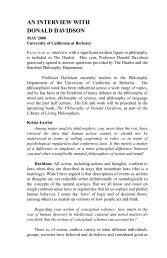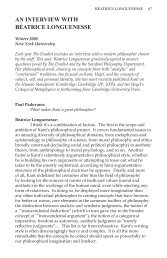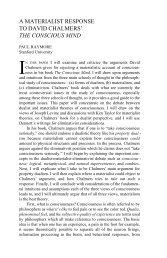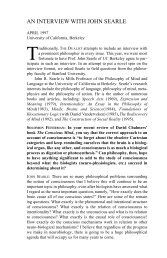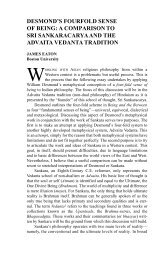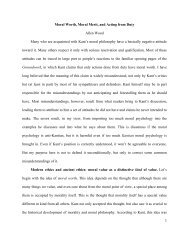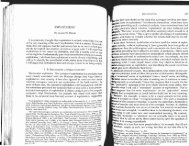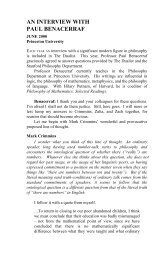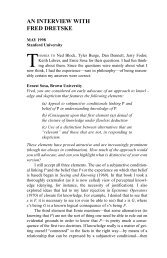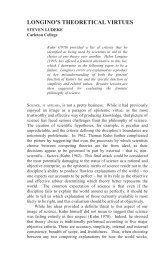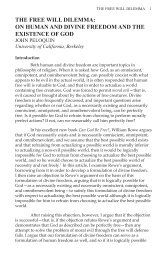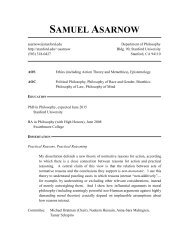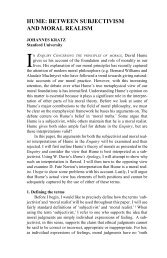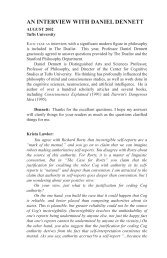The Independence of Right from Ethics Allen Wood Right and ethics ...
The Independence of Right from Ethics Allen Wood Right and ethics ...
The Independence of Right from Ethics Allen Wood Right and ethics ...
Create successful ePaper yourself
Turn your PDF publications into a flip-book with our unique Google optimized e-Paper software.
y another’s choice), ins<strong>of</strong>ar as it can exist with the freedom <strong>of</strong> every other in accordance with auniversal law, [which belongs] to every human being by virtue <strong>of</strong> his humanity” (MS 6:237).This basis, however, is distinct <strong>from</strong> the worth <strong>of</strong> humanity as end in itself that groundsethical duties by providing the motive for obedience to a categorical imperative. For one thing,the worth <strong>of</strong> humanity as end in itself grounds only non-coercible (ethical) duties, whereas duties<strong>of</strong> right are subject to external coercion. Also, humanity as end in itself grounds duties on an end(humanity as end in itself), whereas claims <strong>of</strong> right must be independent <strong>of</strong> every end <strong>of</strong> action.<strong>Ethics</strong> places inner (or self-) constraint on the ends-to-be-produced that we adopt (requiring us toinclude our own perfection <strong>and</strong> the happiness <strong>of</strong> others among these ends); but right leaves endsentirely to our free choice, requiring us instead to limit our actions so that they are consistentwith the external freedom <strong>of</strong> others (MS 6:382). Humanity is the ground <strong>of</strong> right in the sense thatto recognize a person as having humanity is to appreciate the rational structure <strong>of</strong> action as achoice <strong>of</strong> means to an end set by the agent, <strong>and</strong> thus the rational requirement that the choice <strong>of</strong>any rational agent <strong>of</strong> be independent <strong>of</strong> the constraining will <strong>of</strong> another in choosing actions asmeans to one’s own ends. That rational requirement, impartially regarded (hence subject touniversal law), is the foundation <strong>of</strong> right.<strong>Right</strong> as external constraint, <strong>and</strong> as right as duty. <strong>The</strong>re is even a rather strong sense inwhich a duty <strong>of</strong> right does not directly ground my doings or refrainings at all. Recall that thelegislation <strong>of</strong> right does not carry with it duty itself as the legislative incentive. And notice againthat Kant states the universal principle <strong>of</strong> right not as a proposition that tells us what to do, butsimply as a proposition that tells us which actions count as ‘right’. It tells us, as Kant says, nothow we should limit our actions, but how they are limited in accordance with external freedom<strong>and</strong> hence how they may be rightfully limited by others. A right action is one that may not, by14



